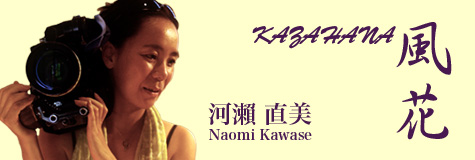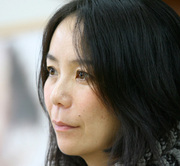
02 Encounters on Lake Leman
Naomi Kawase
Film Director
This time of year always reminds me of a unique film festival held in Nyon, Switzerland. I was once invited to the festival to screen a private documentary I had made before I completed my film Suzaku. Nyon is a tiny town situated on the shores of Lake Leman and is just the right size to stroll around visiting its beautiful castle and cathedral. On the lakeside, you come across people relaxing and enjoying their holidays, escaping the city heat. I am struck by the difference between Europe and Japan whenever I visit old European cities and encounter many people taking a nap or having a picnic lunch in the park, even on weekday afternoons. It was like that in Nyon too, and meeting people who spend their time so richly greatly stimulated my senses.
In spring of 2000, a few years after my first visit to Nyon, I was offered an opportunity to hold a retrospective there. Around that time, I was thinking of quitting film-making, so it seemed a good idea, and I accepted the proposal. That's when I met Aurelien Hancou, a young fellow who was, back then, a student at the University of Geneva. He spoke fluent Japanese which he told me he had acquired by reading manga. I found something very congenial about the way he peppered his speech with young people's slang. As a volunteer helping out with the film festival, he was assigned to take care of me and seemed like an old friend the whole time I was there. In 2001, I also met another important person in Nyon that influenced my life as a film director: Luciano Rigolini, who was a producer at the television broadcaster ARTE. When I was taking a walk along the lake with Aurelien, Luciano walked up to us and abruptly asked, "Which one of your films do you like the best?" I was offended and answered, "Every one of my works is like a precious child to me." "But if you had to choose, which one would you say?" persisted Luciano. I remember glancing at Aurelien to signal that I was leaving, and just walking away ignoring Luciano. I found out later that he was a famous producer, but that meant nothing to me as I was intending to leave film-making. He didn't let up, insisting, "You must make movies!" I couldn't stand his tenaciousness and left for the airport as if to escape from his pursuit. But he followed me all the way to Charles de Gaulle International Airport. I was overcome by his enthusiasm and eventually made Kya Ka Ra Ba A, a sequel to Embracing. For ten years since then, he has been the one person that I can talk about life as seen through movies.

(Left) Luciano Rigolini
(Right) Kya Ka Ra Ba A
On the shores of Lake Leman, I met people who guided me as a film creator, and encountered the history in which the town and its people had been steeped over the years. The church bells ringing in the streets, dinner in the wine cellar of a chateau, almond flower petals blowing in the wind--the memories are so clear in my mind, as though it all happened just yesterday.
 Naomi Kawase
Naomi Kawase
Kawase continues to work out of her hometown Nara. She was awarded the Camera d'Or at the Cannes International Film Festival in 1997 for her film Suzaku (1996) as the youngest winner in its history. Her The Mourning Forest was awarded the Grand Prix at the Cannes International Film Festival in 2007. She has directed many documentary films including Genpin. She lobbied for and is now executive director of the Nara International Film Festival (http://www.nara-iff.jp/en/), which will mark its second year from September 14 to 17, 2012. Nippon Archives series, for which she filmed her beloved Nara and many other sights of Japan, is currently broadcast online. (http://nara.utsukushiki-nippon.jp/)
Official website:http://www.kawasenaomi.com/
Official twitter: http://twitter.com/kawasenaomi
Back Issues
- 2022.7.27 Beyond Disasters - T…
- 2022.6.20 Beyond Disasters - T…
- 2021.6. 7 Contributed Article …
- 2021.4.28 Crossing Borders, En…
- 2021.4.27 Contributed Article …
- 2021.4.20 Contributed Article …
- 2021.3.29 Contributed Article …
- 2020.12.22 Interview with the R…
- 2020.12.21 Interview with the R…
- 2020.11.13 Interview with the R…


